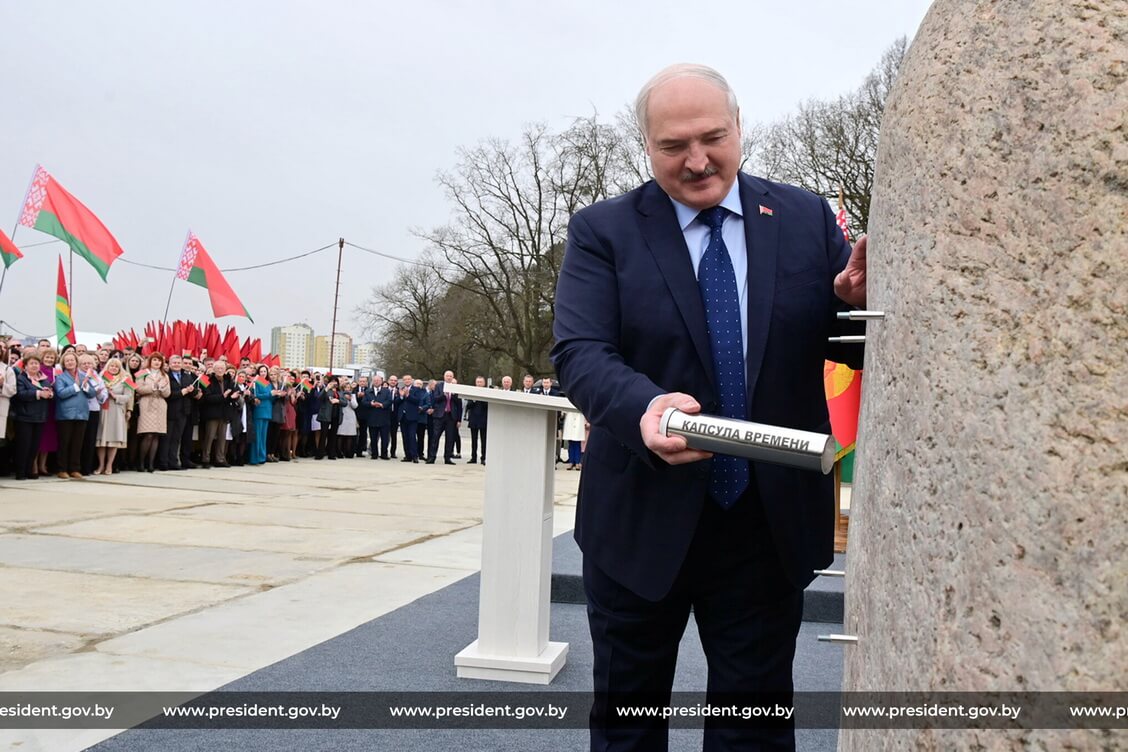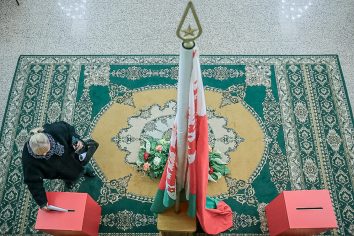On April 2, Alaksandar Łukašenka placed a “time capsule” with a message for future generations in a memorial stone at the city hospital construction site in Hrodna. The Belarusian ruler with his repressive policy is actually dragging his country into the past.

“We are living a peaceful and happy life. Together we are building our beloved, independent Belarus,” reads the message inside the capsule.
Bracing for war
Speaking at the ceremony, the Belarusian ruler accused neighbors of “digging trenches against tanks and other things, increasing spending on offensive weapons.”
It is true that the Lithuanians and Poles are digging anti-tank trenches, obviously not for an attack, but out of fear of a possible attack by Russia, which could involve Belarus.
When Łukašenka says he does not want to go to war, his statement sounds credible. But the problem is that he has fallen into a disastrous dependence on Russia, an aggressive empire.
If at some point Vladimir Putin decides to use Belarusian territory to attack Ukraine or NATO, possibly using the Belarusian army, Łukašenka will not be able to object.
The militarization of all spheres of life in the country and Łukašenka’s tirades about aggressive neighbors serve several purposes.
He casts Belarus as a besieged fortress, a dictator’s classic technique to rally the nation round the flag.
He portrays himself as both an iron-clad warlord ready to fight and a guardian of peace.
Łukašenka reassured his audience in Hrodna, “You are ours. We will not give you away to anyone. . . . Not a millimeter, we will not give anything to anyone here.” It was a bold allusion to the allegedly aggressive Poles who, as Łukašenka has repeatedly claimed, dream of occupying half of Belarus.
In his opinion, his pre-war hysteria somehow justifies the crackdown on the opposition – there is no room for rotten liberalism when the enemy is at the doorstep.
Łukašenka feels it in his gut that his bond with Russian President Vladimir Putin puts Belarus at risk of war, so he is training the army and officials and psychologically preparing the population.
“We are preparing for war, I say it openly. If you want peace, prepare for war – it wasn’t me who came up with it,” he said. Although, to be honest, he should have said, “If you make friends with Putin, prepare for war.”
Isolation
The postelection crackdown on opponents severely damaged Belarus’ relations with the West, while Minsk’s complicity in the Russian war of aggression against Ukraine has led to an open breach.
Some EU and NATO officials see Belarus as Russia’s province rather than an independent state.
Neighbors are ready to isolate it completely. Poland has closed all but one border crossing. Lithuania has left only two of six crossings open. For the residents of the border town of Hrodna, who often travel to Poland, cross-border ties are a sensitive issue.
Łukašenka spun his story that he is an innocent victim of senseless attempts to isolate him.
“They have fenced themselves off. As you can see, it’s not my fault, it’s their policy”.
He accused neighbors of “pursuing their own selfish goals, profiting from the construction of fences at the border.”
Actually, the neighbors’ effort to tighten border security comes in response to the migration crisis engineered by Minsk.
Attempts by third-country nationals to illegally cross from Belarus into the EU soared 44-fold in March from January’s level.
It is debatable whether the checkpoint closures and tighter legalization requirements for Belarusians are adequate measures.
After all, these measures isolate Belarusians within the dictatorship, cutting off ties with the democratic world.
Beyond doubt, the main source of tension is Łukašenka. He orchestrated the migration crisis, by suspending a readmission agreement with the EU in response to sanctions that followed the forced landing of a Ryanair flight in Minsk, an operation masterminded by his security services.
He provided Belarus’ territory and infrastructure for the Kremlin’s war against Ukraine.
Belarus to survive in spite of Łukašenka

Łukašenka laying the time capsule in Hrodna on April 2, 2024. Source: www.president.gov.by
The government’s post-2020 policy has polarized the public. Hundreds of thousands of democracy supporters have been driven into exile.
“Some have gone abroad in recent years, but many want to return now, including those applying to the [repatriation] commission chaired by Prosecutor General Andrej Švied,” Łukašenka claimed in Hrodna.
Most of those who left are educated, skilled and pro-active people. Deputy Interior Minister Mikałaj Karpiankoŭ said last fall, probably quoting a figure from a classified document, that “350,000 of those who do not support us have fled abroad.”
The repatriation commission has received just over a hundred applications, which is not surprising. The government is vindictive and does not really seek civil consent. Instead, it demands that the “fugitives” crawl back on their knees.
Prosecutor General Švied said in February that the commission had received 150 applications, of which 37 were considered, while the rest did not meet the requirements. About a dozen people returned to Belarus, he said.
The exodus has left huge holes in the labor market. The demographic prospects are grim, no matter how laud Natalla Kačanava, speaker of the Council of the Republic, calls for increasing the birth rate by propagating “traditional values.”
By the way, the term “traditional values” comes from the vocabulary of the Russian world spreading its tentacles into Belarus after the defeat of the peaceful uprising in 2020.
Interestingly, the Russian Center for Science and Culture, a stronghold of Moscow’s soft power, has recently opened its office in Hrodna.
In defiance of the democratic world, the Russian regime is acquiring medieval features. Łukašenka is following in its footsteps.
The difference is that Putin dreams of turning back the clock and recapturing what he calls “native Russian land,” territories that once controlled by the Russian Empire more than 200 years ago.
Meanwhile, the Belarusian ruler is not eager to go to war with neighbors, but also wants to turn back the clock to rule forever with an iron fist in his piece of land, as he puts it.
In what seems to lack any common sense, he is sending a peaceful message to the future while his political opponents are suffering in prisons in medieval conditions.
If Belarus survives as an independent state and returns to the European fold, it will be in spite of his policies.
